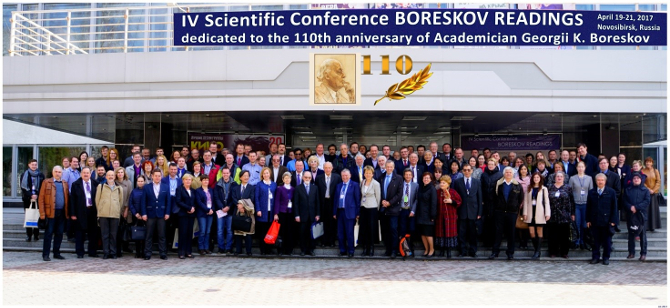
Boreskov Institute of Catalysis was founded in 1958 as a part of the Siberian Branch of the Russian Academy of Sciences. The founder and the first Director of the Institute till 1984 was academician Georgii Konstantinovich Boreskov.

One of the main activity areas of the Boreskov Institute of Catalysis is fundamental investigations in catalytic science to discover new principles of chemical reactions and to create innovative catalytic compositions and technologies.
Read more...

Boreskov Institute of Catalysis pays great attention to the training of young scientists. Each year more than 100 students and post-graduates are being trained at its research and educational facilities. The Institute collaborates with many educational organizations, including:
Read more...

For more than half a century, the Boreskov Institute of Catalysis is at a cutting edge of innovative R&D for chemical and petrochemical industries, energy power, environmental protection.
Read more...
11 May 2017
The Readings take place every ten years since 1987. This year the conference was attended by nearly 200 experts from Russia, Kazakhstan, USA, Poland, Spain, Germany, Italy, Japan, the Netherlands, and Great Britain. The House of Scientists and Boreskov Institute of Catalysis SB RAS hosted the conference.
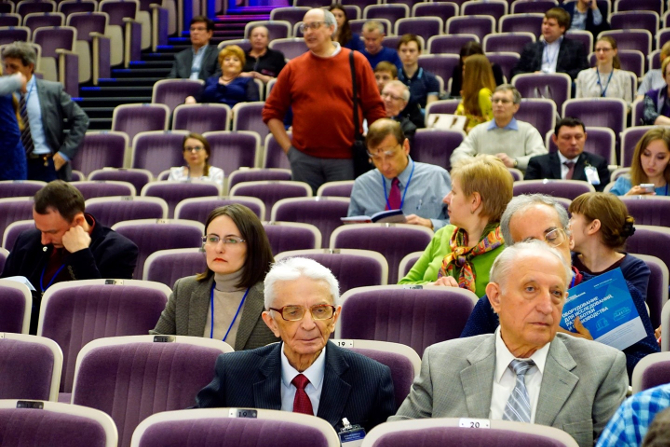
Great Hall of the House of Scientists in Akademgorodok before the conference opening; in the foreground: Doctor of Chemistry Alexander Khasin, Professor Valery Sokolovskii, Rennovia Inc., USA
The conference was supported by the Russian Foundation for Basic Research. The sponsors of the event were the Foundation of infrastructure and education programs Rusnano, Honeywell UOP, Institute of Hydrocarbons Processing SB RAS, “Special Design and Technological Bureau “Katalizator”, and “Akadem-Komplekt”.
The organizers of the conference include Siberian Branch of the Russian Academy of Sciences, Boreskov Institute of Catalysis SB RAS, Novosibirsk State University, Zelinsky Institute of Organic Chemistry RAS, Scientific Council on Catalysis of RAS Chemistry Division, Lomonosov Moscow State University, Institute of Hydrocarbons Processing SB RAS, and Novosibirsk Division of Mendeleev Russian Chemistry Society.
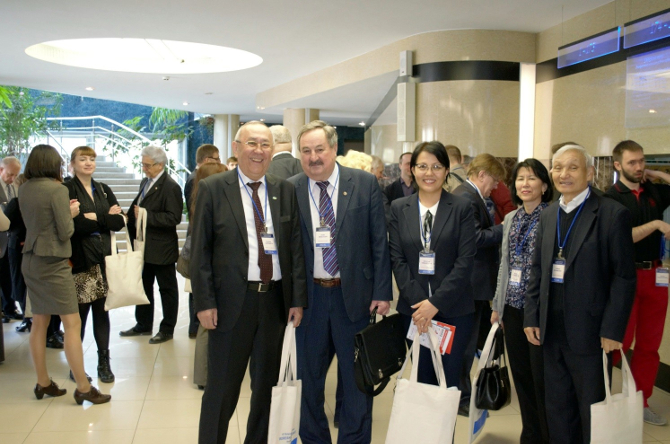
On the foreground: one of the first students of G.K. Boreskov, director of the Institute of Coal Chemistry and Material Science SB RAS, corresponding member of RAS Zinfer Ismagilov (second from the left) and the delegation from Almaty, Kazakhstan
During three working days the participants of the conference listened and discussed three plenary and ten key lectures, oral and poster presentations in the field of fundamental research and practical aspects of catalysis.
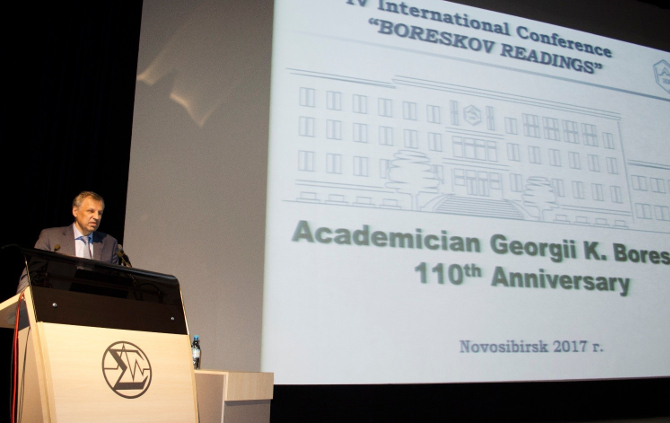
Director of Boreskov Institute of Catalysis SB RAS Academician Valerii Bukhtiyarov opened the conference with the memorial lecture on the life and research activity of Georgii Boreskov.
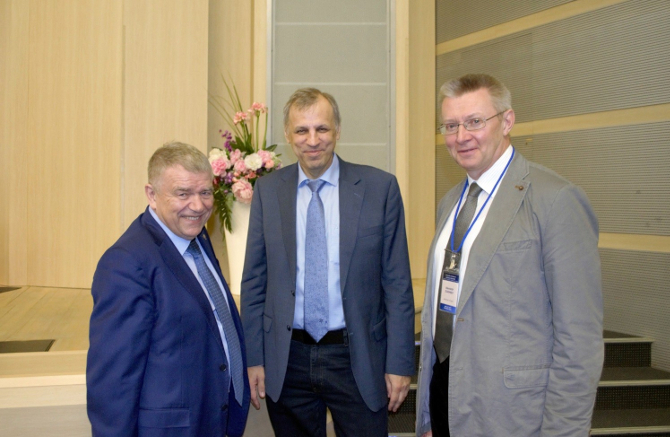
Left to right: academic advisor of BIC SB RAS Academician Valentin Parmon, director of BIC SB RAS Academician Valerii Bukhtiyarov, vice-director of Institute of Organic Chemistry RAS Dr. Aleksandr Stakheev
The plenary session in the Great Hall of the House of Scientists gathered a large audience. In the first plenary lecture Prof. Valery Sokolovskii (Rennovia Inc., USA) considered the prospects of the use of heterogeneous catalysis for production of commodity chemicals from renewable feedstocks (starch, sugars, cellulose).
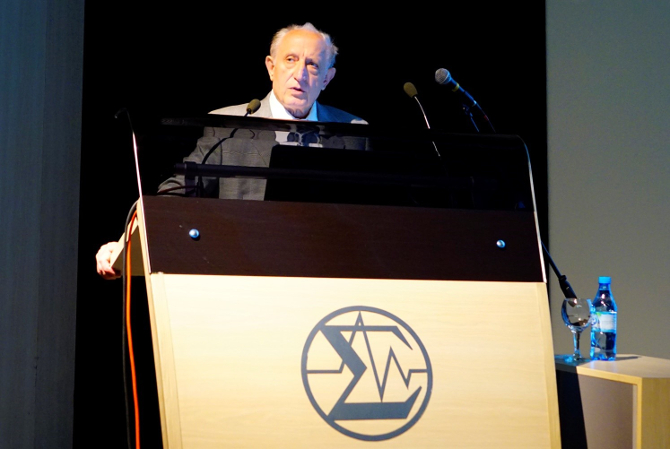
Professor Valery Sokolovskii, Rennovia Inc., USA
The plenary lectures were also given by Malgorzata Witko (director of the Institute of Catalysis and Surface Chemistry, Krakow, Poland), concerning the problems of oxygen activation on metal-oxide surfaces, and Professor Wataru Ueda (Katagawa University, Japan), presenting the results of development of new complex metal oxides having structural complexity with unique catalytic properties, which are of great importance for the fundamental research and practical use.
 Professor Malgorzata Witko, Institute of Catalysis and Surface Chemistry, Krakow, Poland
Professor Malgorzata Witko, Institute of Catalysis and Surface Chemistry, Krakow, Poland
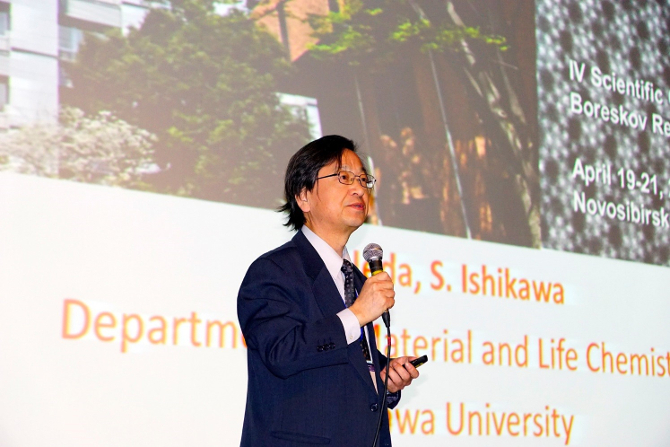
Professor Wataru Ueda, Kanagawa University, Japan
The key lectures and oral presentations discussed the latest achievements in the field of development of fundamental basics of heterogeneous oxidative catalysis related to the successful use of physical methods of studying the catalyst state in the catalytic reactions as well as the theoretic methods of state and reaction capacity of oxygen on the catalyst surface. The experts in the field of synthesis of up-to-date catalysts demonstrated their achievements in the design of nanostructured catalysts, including those based on the nanoparticles of metals and alloys supported on oxides.
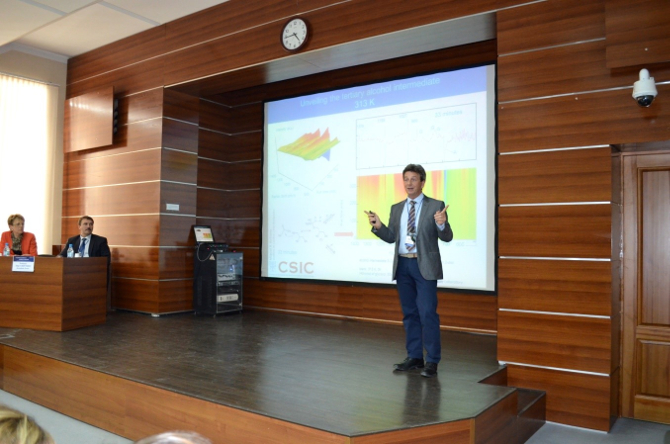
Professor Miguel A. Bañares, ICP-CSIC, Madrid, Spain, with the key lecture at School-Symposium of young scientists
The School-Symposium of young scientists “In situ and operando studies of the catalytic reactions” took place during the conference. The Organizing committee awarded two participants of the School-Symposium, Dr. Olga Bulavchenko and Dr. Dmitry Krasnikov, with the diplomas and money prizes for their high achievements in using in situ methods in the studies of heterogeneous catalytic reactions.
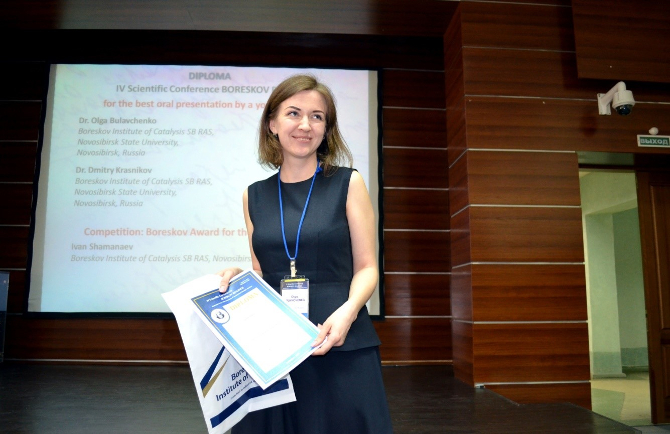
Dr. Olga Bulavchenko
The post-graduate students of Boreskov Institute of Catalysis SB RAS competed for the Boreskov scholarship, which was awarded to Ivan Shamanaev for continuing his work on development of efficient catalysts for obtaining the motor fuels from the renewable sources.
An important event of the conference was the Roundtable discussion “Ideas of G.K. Boreskov and Today’s World”. The ideas and principles of Georgii Boreskov on the systematic approach to catalysis, from the fundamental basis for insight of catalytic activity, preparation of the catalysts to the calculation of reactors and industrial realization of the catalytic processes, became the globally recognized standard.
Academic advisor of the Institute for Problems of Chemical and Energetic Technologies SB RAS Academician Gennady Sakovich delighted the audience with his warm reminiscences on their joint scientific and administrative work with Georgii Konstantinovich. A great interest was sparked by the reports of director of the Institute of Hydrocarbons Processing SB RAS Dr. Alexandr Lavrenov and development director of Special Design and Technology Bureau “Katalizator” Sergei Kildyashev. Both these institutions were conceived by Georgii Boreskov.
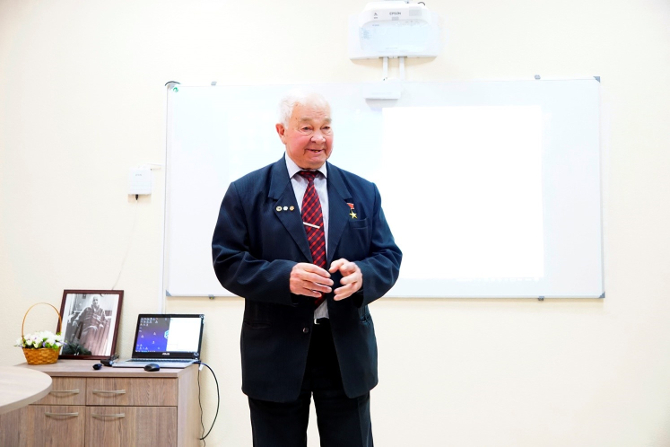
Academic advisor of the Institute for Problems of Chemical and Energetic Technologies Academician Gennady Sakovich at the Roundtable discussion “Ideas of G.K. Boreskov and Today’s World”
General director of “ZAO Samarskiy Zavod Katalizatorov” (Samara Plant of Catalysts) Anton Kopytin directed the participants’ attention to the improved highly efficient sulfuric vanadium catalysts on silica gel and diatomite supports, which the plant produces under license of Boreskov Institute of Catalysis since 2002. The history of developing of barium-aluminum-vanadium catalyst begins in the 1930s, as it was developed and industrially realized under the guidance of Georgii Boreskov.
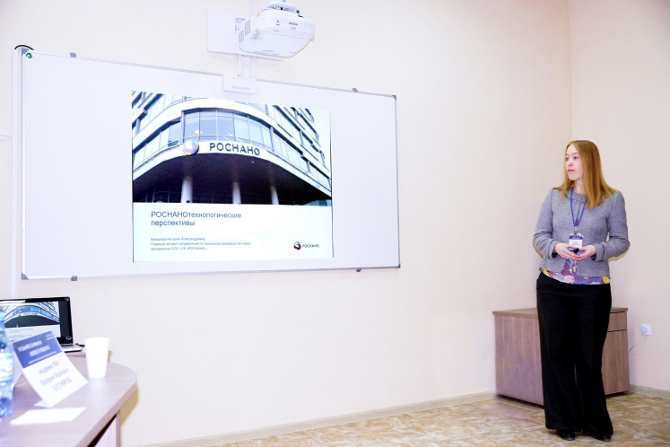
Dr. Natalia Emashova, the leading expert of technology of new material production, R&D department of Rusnano, Moscow
The conference in the memory of Academician Boreskov gave a handle to talk on the sidelines about Georgii Konstantinovich with its participants.
One of the world's foremost specialists in catalysis, Professor Graham Hutchings, Director of Cardiff Catalysis Institute, Cardiff University, Great Britain, who presented a key lecture "Catalysis Using New Nanomaterials", said:
"I did meet Boreskov when I worked for ICI (Imperial Chemical Industries). Boreskov visited our laboratories when I worked there. I was a junior researcher. I was certainly aware of him being extremely important person in the area of catalysis, and of course, I was aware of many of his papers that he had written in those days. A lot of papers were written in a particular Russian journal. I not sure I remember the name of the journal, I think it was Kinetics and Catalysis, but ICI had it in the library. There was a number of Russian journals that were specifically translated into English. They contained very short papers but with many interesting ideas, so I was able to bring these into the projects I was working on, when I was in industry. We recognized the importance of these ideas and worked on them in our projects. That's where Boreskov’s influence was.
I was working in industry, and then when I became an academic in 1984 I had a lot of ideas from my industrial experience that I wanted to take into academia. So my work was heavily influenced by everything I had done in industry".
 Professor Graham Hutshings with his wife Sally in the House of Scientists SB RAS
Professor Graham Hutshings with his wife Sally in the House of Scientists SB RAS
Speaking about the conference, Professor Hutchings emphasized again the importance of communication between science and industry and, in particular, highly praised the key lecture of Dr. James Rekoske from Honeywell UOP, USA: “You have attracted some extremely interesting people both locally and internationally. Presentation by UOP was excellent from the industrial perspective. It is fantastic to have such links like Boreskov Institute has with other companies, to work together as a team. Very few conferences have such ties to industrial folks. That is something, which you should encourage and do more“.
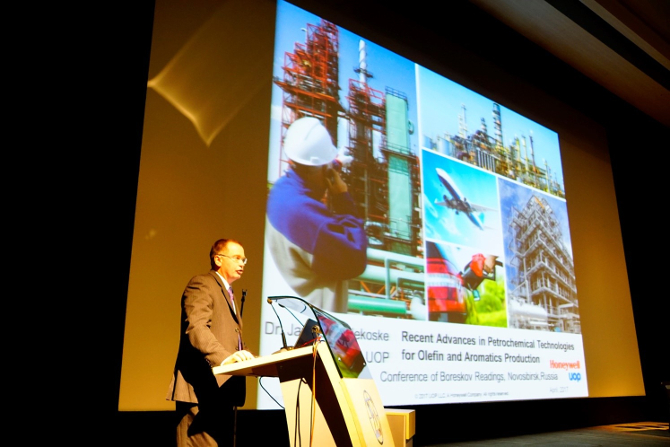 Dr. James Rekoske, Honeywell UOP, USA
Dr. James Rekoske, Honeywell UOP, USA
Professor Hutchings also highlighted the active participation of young scientists in the conference: “I find the young members really enthusiastic. They are very keen and they want to ask questions, and they want to engage in debates and that is interesting. The poster session was exceptionally alive, some extremely good science was being discussed”.
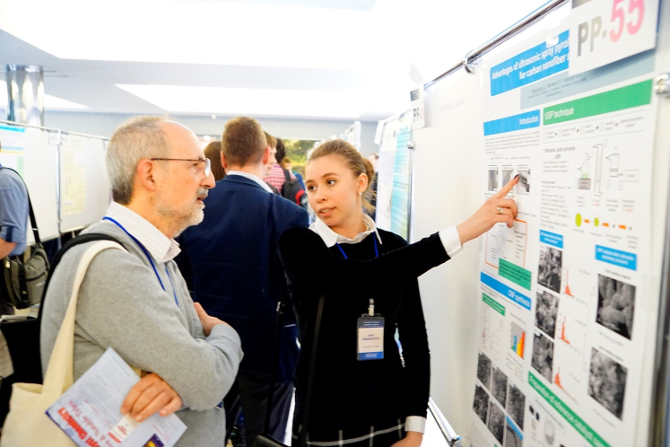
At the poster session in the House of Scientists SB RAS
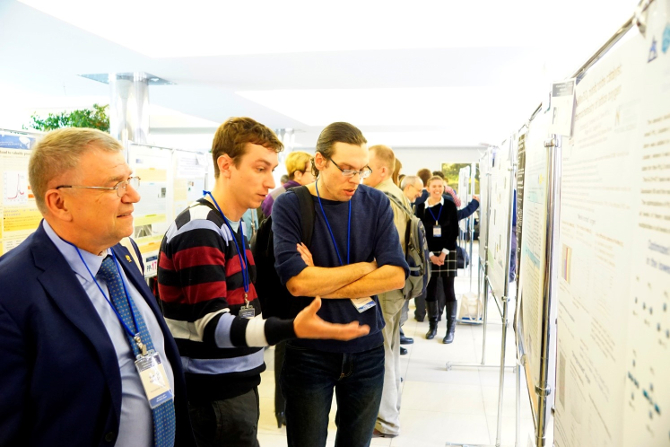 At the poster session in the House of Scientists SB RAS
At the poster session in the House of Scientists SB RAS
Another keynote lecturer, Dr. Prof. Mark Tsodikov of Topchiev Institute of Petrochemical Synthesis RAS warmly spoke about Georgii Boreskov and the Institute of Catalysis, the creation of which Boreskov believed to be the main accomplishment in his life:
“Academician Boreskov seems to be a symbol for me. I met him once and am proud of it now. Georgii Konstantinovich was the mover of all sulfuric industry. It is known to the whole country and the whole world, too. That is why he is one of the greatest catalysis chemists. On the other hand, I am a “catalytic man” and an old friend of the Institute of Catalysis. So I have a great respect toward Georgii Konstantinovich for founding such an excellent institute. I have a lot of friends here, who helped me a lot in my work. Some of them are already gone. They gave me a lot, maybe the most of what there is.
I always appreciate the way the conferences are organized here, because the colleagues take it very seriously, and all participants are engaged in science, the atmosphere of the conferences is always inspirational. It is interesting to come here and check how much you have achieved, to communicate with the colleagues, to recharge with enthusiasm. You come and immerse into work with complete understanding from your peers. This is so wonderful”.
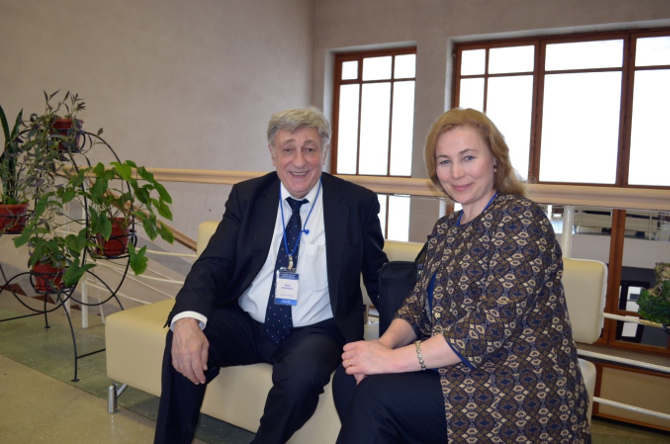
Dr. Mark Tsodikov and Dr. Larisa Arkatova, SDTB “Katalizator”
Professor Valery Sokolovskii (Rennovia Inc., USA), one of the best-loved students of Georgii Konstantinovich, told us about his teacher:
“Let me start from that I ended up in catalysis because of my meeting with Boreskov. My major in university was “isotope separation”, and I was very proud of it. At that time everything concerning atom was extremely popular. But one day my scientific supervisor told me, “I’m going to meet Boreskov. He organizes the Institute of Catalysis in Siberia. Now he is in Moscow. Come with me, I think it’ll be interesting for you”. I thought, Academy of sciences is good, but how does catalysis come into picture since I’m going to deal with isotopes? Nevertheless, I decided to go. Boreskov impressed me so much that I realized it was an opportunity of a lifetime and agreed to go to Siberia immediately.
I was fortunate to work with him more than 20 years. Surely, I learned a lot from him in his attitude to science and life in general. He was an extraordinary man. One could say that he was intelligent and talented, but to say that is to say nothing. I have met many very intelligent and talented people in my life, but none of them could come near Boreskov.”
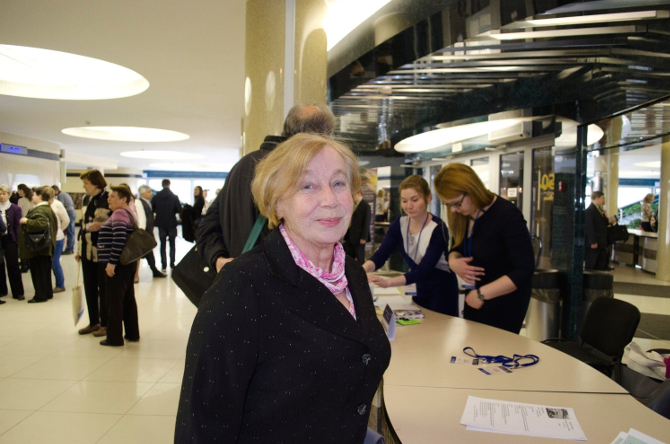 One of the first students of G.K. Boreskov Dr. Tamara Andrushkevich, the author of the book about Georgii Konstantinovich from the series “Materials to bibliography of the USSR scientists”
One of the first students of G.K. Boreskov Dr. Tamara Andrushkevich, the author of the book about Georgii Konstantinovich from the series “Materials to bibliography of the USSR scientists”
Speaking of the conference Prof. Sokolovskii highlighted the importance of that “Boreskov Readings allow the new generation of the researchers to become familiar with the ideas underlying the foundation of the Institute of Catalysis, which did not lost their value after so many years.
To finish the description of the conference we would like to quote Boreskov’s words, given by his student Prof. Sokolovskii:
• On academic studies: “Often people think that a criterion of an academic study is that it does not have any practical application. I believe that a true academic study necessarily leads to a practical result”.
• On attitude to science: “The work of a scientist is a great privilege and a great responsibility. This work implies an absolute honesty, since often only the researcher knows the degree of accuracy of his or her result”.
